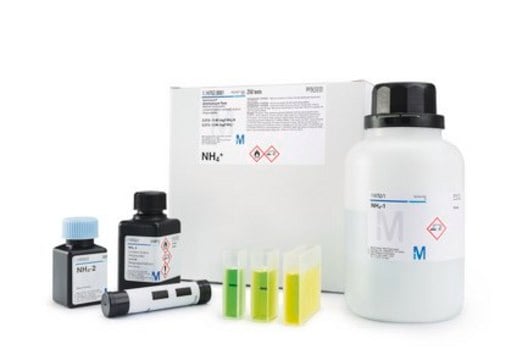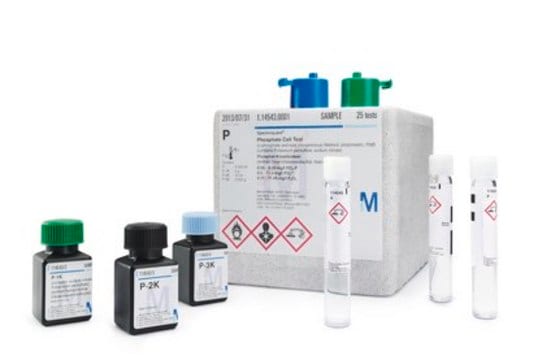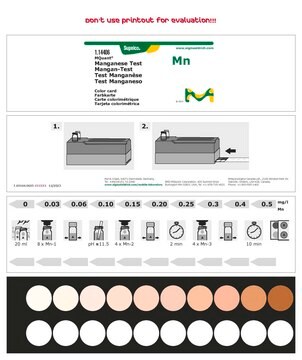1.00816
Manganese Test, photometric
photometric, 0.10-5.00 mg/L (Mn), Spectroquant®
About This Item
Produits recommandés
product name
Manganese Cell Test, photometric, 0.10-5.00 mg/L (Mn), Spectroquant®
Gamme de produits
Spectroquant®
Niveau de qualité
Utilisation
sufficient for 25 tests
Analyte(s) spécifique(s)
manganese
Plage de mesure
0.10-5.00 mg/L (Mn)
Technique(s)
photometry: suitable
Compatibilité
for use with Spectroquant® Move 100
for use with Spectroquant® Nova 60 A
for use with Spectroquant® Prove 100
for use with Spectroquant® Prove 300
for use with Spectroquant® Prove 600
Méthode de détection
photometric (Formaldioxime)
Température de stockage
15-25°C
Description générale
The method is analogous to DIN 38406-2.
This Spectroquant® Manganese Cell Test allows the accurate quantification of the manganese(II) ions content in aqueous samples.
Method applied: In alkaline solution manganese(II) ions react with an oxime to form a red-brown complex which is determined photometrically.
The Spectroquant®Cell Tests come with prefilled 16 mm round cells and all the required reagents to perform the analysis according to the instruction leaflet provided.
All Spectroquant® Cell and Reagent Test Kits are equipped with the unique Live ID (2D barcode) which allows seamless method recognition and contains essential information such as lot number, expiry date, and automatic calibration updates.
Application
- Small-Molecule Fluorescent Probes for Binding- and Activity-Based Sensing of Redox-Active Biological Metals.: This review discusses the development of small-molecule fluorescent probes for detecting redox-active metals, including manganese, in biological systems. These probes enable precise analytical measurements and are essential in understanding metal ion homeostasis and signaling in cells. The manganese cell test provides valuable insights into redox biology and metal interactions (Grover et al., 2024).
- A Ten-Minute Bioassay to Test Metal Toxicity with the Freshwater Flagellate Euglena agilis.: This study introduces a rapid bioassay for assessing metal toxicity using Euglena agilis. The manganese cell test is a crucial component of this bioassay, providing a quick and reliable method for evaluating manganese toxicity in freshwater environments (Choi et al., 2022).
- A manganese (II) complex tethered with S-benzyldithiocarbazate Schiff base: Synthesis, characterization, in-vitro therapeutic activity and protein interaction studies.: This research focuses on synthesizing and characterizing a manganese (II) complex, examining its therapeutic potential and interactions with proteins. The manganese cell test plays a vital role in analyzing the complex′s biochemical properties and efficacy (Kongot et al., 2020).
- [New materials suitable for implantation--preparation for implants].: This article explores new materials for medical implants, emphasizing the importance of biocompatibility and durability. The manganese cell test is used to evaluate the interaction between manganese-based materials and biological tissues, ensuring their safety and effectiveness for implantation (Adam et al., 2003).
Informations légales
Mention d'avertissement
Danger
Mentions de danger
Classification des risques
Acute Tox. 3 Oral - Aquatic Acute 1 - Aquatic Chronic 2 - Carc. 1B - Eye Dam. 1 - Met. Corr. 1 - Muta. 2 - Skin Corr. 1B - Skin Sens. 1 - STOT RE 2 Oral - STOT SE 3
Organes cibles
Respiratory system, spleen
Code de la classe de stockage
6.1C - Combustible, acute toxic Cat.3 / toxic compounds or compounds which causing chronic effects
Classe de danger pour l'eau (WGK)
WGK 3
Certificats d'analyse (COA)
Recherchez un Certificats d'analyse (COA) en saisissant le numéro de lot du produit. Les numéros de lot figurent sur l'étiquette du produit après les mots "Lot" ou "Batch".
Déjà en possession de ce produit ?
Retrouvez la documentation relative aux produits que vous avez récemment achetés dans la Bibliothèque de documents.
Protocoles
Photometric determination subsequent to acid mineralisation
Notre équipe de scientifiques dispose d'une expérience dans tous les secteurs de la recherche, notamment en sciences de la vie, science des matériaux, synthèse chimique, chromatographie, analyse et dans de nombreux autres domaines..
Contacter notre Service technique





